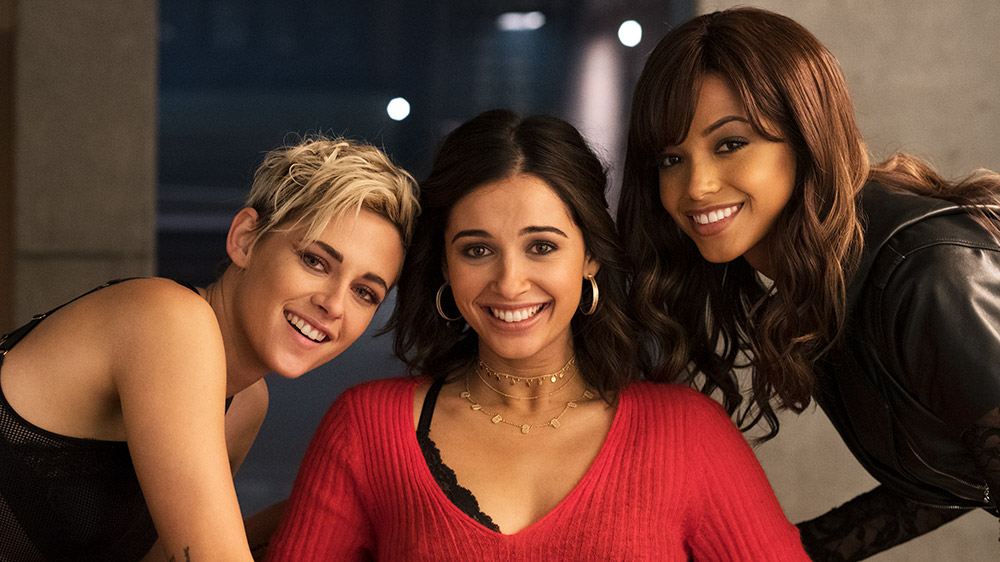There is much to be said about releasing a Charlie’s Angels instalment in a time where gender inequality and female representation are (rightfully) heated topics.
The sheer impact this climate has had on modern filmmaking is watermarked in time, with several films in the past few years – Widows (2018), Ocean’s 8 (2018), The Kitchen (2019), Hustlers (2019) – using misogyny as a tool for female characters to go undetected while conducting covert activity.
While dipping into this trope and paying homage to the quirkiness that made its 2000’s predecessor – a film which celebrated its characters’ eccentricities though spent a few too many uncomfortable seconds-longer gazing on female bodies – a lasting success, Charlie’s Angels (2019) is tasked with being entertaining, reverent and progressive.
Thankfully, there is no better-equipped candidate than Elizabeth Banks – a writer-director who has succeeded with developing enjoyable comedies, lead by women, that celebrates female togetherness (such as 2015’s Pitch Perfect 2) – to relaunch a series like Charlie’s Angels in 2019. As Shania Twain once sang, ‘let’s go girls.’
Long gone are the days of Angels using Shaw Brother’s inspired kung-fu and duking it out to the sound of The Prodigy. In 2019, they are now gun-toting, MMA brawling Femme Fatales that tussle to heavy-baseline Ariana Grande bops. They discuss work over elaborate cheese boards, receive offers of Kombucha from their wellbeing coach (and I am not talking about Instagram), and deal with a culture of sexism on the daily. Yes, tastes have differed, but some things haven’t changed.

Receiving orders from Charlie, the mysterious owner of the Townsend Agency, the news of a weapon of mass destruction known as Calisto brings undercover ‘lady spies’ aka Angels Sabina (Kristen Stewart), Jane (Ella Balinska) and the recently recruited whistle-blower Elena (Naomi Scott) together on a mission throughout Europe to take down an elusive villain. Banks’ Bosley, the first woman promoted to the Lieutenant-esque rank, rounds out their crew as the wheels of the operation.
The trio of Angels prove a winning combination when on screen together. They are respectively given as many opportunities to demonstrate extreme goofiness as they are intelligence; the end result crafting relatable characters with likeable personalities. Scott and Balinska handle themselves superbly but do end up supporting the K-Stew comeback tour. Stewart, who has spent a good part of five years running away from her teen vampire infamy, is thrown comedic watermelons by Banks. With the no-filtered Sabina, Stewart relishes in the opportunity to subvert audience expectations of the recluse actress. She dials up the freneticism in a performance that is empowering, hilarious, and sure to reignite her spark in Hollywood.
The expectation of Charlie’s Angels to embrace its campy hokum precedes it. Those looking for constant winks, nods and god-damn hair flips are better off watching the 2000’s movies/reruns of the TV series. Banks, though having clearly done her homework, allows the film to be more than just indulgent references. She grounds the film with a James Bond sense of pseudo-serious mystery before rewarding the viewer with a deliciously over-the-top third act.

Banks succeeds in allowing Charlie’s Angels to embrace the issues of 2019 while not being distracted by politics. The film spruiks the importance of diversity and inclusion so seamlessly that it does not interrupt the entertainment value. That said, sections of Charlie’s Angels do fall asunder. Action remains a staple of the film but moves so hastily that it occasionally becomes choppy. The soundtrack, comprising of powerful female anthems, is on a mission to sell albums rather than add thematic weight to scenes. Lastly, the supporting cast – including Djimon Hounsou, Patrick Stewart and Sam Claflin – are treated as expendable.
For all these shortfalls, the combo of Banks, Stewart, Balinska and Scott coalesce into a winning team that brings Charlie’s Angels out of the vault and into 2019.
Fun Fact:
The movie features extensive use of guns and other explosive weaponry. This is a marked change from its two cinematic predecessors, in which star and producer Drew Barrymore insisted that the Angels use no guns at all and almost no weapons aside from their own martial arts skills.




COMMENTS